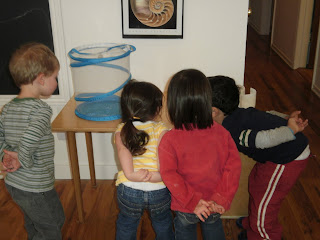 "Solicitous care of living things affords satisfaction to one of the most lively instincts of the child's mind. Nothing is better calculated than this to awaken an attitude of foresight."
"Solicitous care of living things affords satisfaction to one of the most lively instincts of the child's mind. Nothing is better calculated than this to awaken an attitude of foresight." - Maria Montessori
How do we observe specimens that are too fragile to handle?
With our hands behind our backs.
I took this picture, not because I was surprised by the children's interest in the new collection of classroom arthropods (a praying mantis egg case, six ravenous Painted Lady caterpillars that hatched this past week and have already molted twice, and a jar of fruit flies to feed the praying mantis nymphs), but because I was particularly pleased with their self control.
Between the age of two and three, a child begins to develop the ability to inhibit actions. Prior to the age of two, when a child is hungry, tired, or over-stimulated, it is the adult who must work out a solution and the child is unable to be patient and understand that it may take the adult time to do what they are asking. Young children become increasingly cooperative as their neurological system matures and allows them to control their behavior.
Dr. Montessori had a fascinating approach to helping young children develop patience, prudence, and self control; she believed that children learn to govern and discipline themselves by the use of reason by being entrusted with the responsibility of caring for themselves and for other things (participating in their family and community and caring for plants and animals in their environment):
"Children are inspired with a feeling for nature... He stands in respect to the plants and animals in relations analogous to those in which the observing teacher stands towards him. Little by little, as interest and observations grow, his zealous care for the living creatures grows also, and in this way, the child can logically be brought to appreciate the care which his mother and teacher take of him."
The Montessori classroom contains numerous motives for children to practice "Care of the Self" (preparing independent snack, putting on one's own clothing, learning to blow one's own nose, wash one's own face and hands, etc) and "Care of the Environment" (watering plants in the classroom, taking out compost, setting the communal tables, sweeping, mopping, caring for classroom animals, etc).
 No matter how many times I see it, I admit that I always marvel at the self-restraint of children educated in this manner. Groups of excited, joyful, children, some of whom are barely two years of age, can be entrusted with the most fragile objects imaginable in the Montessori environment because the classroom provides a level of structure which is appropriate to the age-level of the students (giving them freedom within clearly defined limits) and because they receive direct instruction in grace and courtesy and examples worthy of imitation (the adults in the room model the behaviors they wish to see imitated).
No matter how many times I see it, I admit that I always marvel at the self-restraint of children educated in this manner. Groups of excited, joyful, children, some of whom are barely two years of age, can be entrusted with the most fragile objects imaginable in the Montessori environment because the classroom provides a level of structure which is appropriate to the age-level of the students (giving them freedom within clearly defined limits) and because they receive direct instruction in grace and courtesy and examples worthy of imitation (the adults in the room model the behaviors they wish to see imitated).
 In a world where children are constantly being handed a myriad of plastic substitutes for cups, plates, and playthings, it is easy to imagine the delight and increase in self- respect they experience in the classroom where we constantly share and entrust them with beautiful, breakable, and fragile materials (like this Praying Mantis egg case).
In a world where children are constantly being handed a myriad of plastic substitutes for cups, plates, and playthings, it is easy to imagine the delight and increase in self- respect they experience in the classroom where we constantly share and entrust them with beautiful, breakable, and fragile materials (like this Praying Mantis egg case).
Montessori's revelation was that the opportunity for character development (to practice stewardship and self-discipline by controlling their own behavior and applying their talents and intellect to worthy purposes) provided by lessons like these is even more important then the cognitive/curricular aims of the lesson.
Researchers at Stanford appear to have confirmed her belief, finding that the degree of self-control acquired by children in pre-school is an accurate predictor of their level of self control and positively correlated with higher cognitive and social skills at age eighteen. Self-control (and, particularly, the ability to delay gratification) is also the best predictor of future educational and vocational achievement (David Brooks, NYT, May 7, 2006).

 "Solicitous care of living things affords satisfaction to one of the most lively instincts of the child's mind. Nothing is better calculated than this to awaken an attitude of foresight."
"Solicitous care of living things affords satisfaction to one of the most lively instincts of the child's mind. Nothing is better calculated than this to awaken an attitude of foresight." 



No comments:
Post a Comment